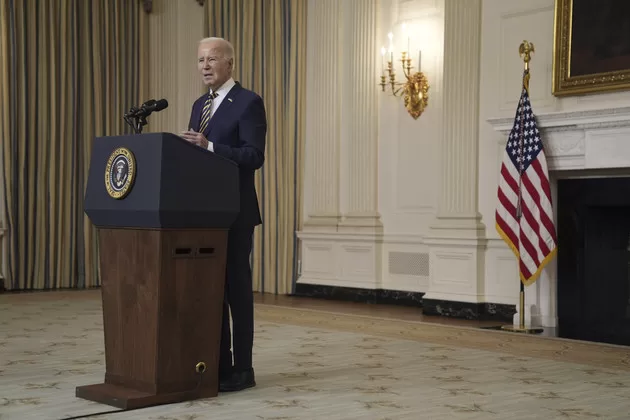Biden wasted little time. Before cameras at the White House on Tuesday, he promised to take the GOP opposition to the bill “to the country” and blamed his likely general election opponent, Donald Trump, for masterminding the death of the deal to keep the border as an active campaign issue.
Democrats followed suit, echoing Biden’s message — and urging him to deliver it with uncharacteristic force.
The president should “go to the border, stand there and say, ‘We have a crisis that I can’t fix by executive order. You have to give me the authority. Here is the bill,’” said Sen. Chris Coons (D-Del.), a close Biden ally. “He should stand there and say there is a way to fix this and it’s languishing on the Senate floor because Republicans don’t want to fix the problem.”
Sen. Chris Van Hollen (D-Md.) said Democrats need “to focus like a laser beam on the fact that Republicans, for totally political purposes, destroyed a bipartisan border deal.”
“What you have here is the sad fact that too many Republicans have subcontracted out their vote to Donald Trump,” he added. “I mean, that’s how you have a situation where they declare a bill dead before they’ve even read it.”
The White House plans to seek out opportunities to talk about the issue in the future, according to an administration official. Administration officials felt buoyed by the breadth of support for the legislation, including the Wall Street Journal editorial page and the National Border Patrol Council, the border patrol agent union that is aligned with former President Trump.
But while Democrats privately agreed that they’d been gifted a political opening, not everyone was confident in the capacity to exploit it. Many stressed that it would take a sustained White House effort to make the public believe that Republicans were responsible for a situation on the border with a Democrat in the White House.
“I don’t know how you avoid the conclusion that [Republicans are] really not interested in solving the problem at the border. They’re interested in maintaining an electoral issue,” said Sen. Angus King (I-Maine). Yet, “it remains to be seen whether that can be communicated effectively.”
Speeches and utterances at campaign rallies would be insufficient, Democrats warned. Biden would “really have to elevate it and hammer it home,” as Jim Manley, a top aide to former Majority Leader Harry Reid, put it. “Because these guys, through sheer incompetence, have given Democrats a fantastic selling point.”
Asked if Biden had shown the ability to do that, Manley took a second to weigh his response. “Not necessarily,” he replied.
Immigration reform advocates sympathetic to the White House, meanwhile, worried the president would not couple whatever rhetorical move he made to make Trump pay politically with substantive action to address the border crisis. They argued that the White House had effectively been given a green light by Republicans to pursue executive actions on a host of fronts, and that they needed to promptly do so.
“I really worry they think they can politic their way out of this issue,” said one top advocate, who was granted anonymity to candidly assess White House operations. “But on the margins of this they have failed to transform an immigration system. They now have to have a policy agenda.”
Biden promised to take the GOP opposition to the bill “to the country” and blamed Donald Trump for masterminding the death of the deal to keep the border as an active campaign issue.
|
AP
That Democrats even found themselves in a place to debate how best to turn the issue of migration into a political advantage was, itself, a testament to the chaotic developments on the Hill over the past few days.
Having spent months in intense negotiations, Senate lawmakers unveiled a deal late Sunday that would have increased resources to border agents, tightened standards for asylum claims, added work permits and set standards at which the border would largely be closed down.
Trump told Republicans to kill the measure, arguing the deal would diminish an effective campaign issue and that they could secure a better one with him in the Oval Office. While Republican skepticism to the bill was already circulating, GOP lawmakers fell in line. Some rank-and-file House Republicans publicly said they would oppose the plan, even before it was released, in an attempt to preserve it as a political issue. Their common refrain was that the Biden White House created the current crisis and already possessed the tools to solve it.
Immigration policy experts say there are steps that Biden can now take. Some would be welcomed by conservatives, such as moving more personnel and other resources to the border and processing centers along with tightening asylum eligibility. But many options would leave them howling.
Among the executive actions outlined by advocates was the use of executive authorities to expand pathways for humanitarian parole, scale up refugee programs and broaden work permits. Biden, they argued, could also take actions to provide more protections for so-called Dreamers and create new eligibility designations for temporary protective status.
The overarching idea would be to divert migration away from the southern border into more manageable avenues. And Democrats said Biden should take such actions even if it risks exposing him to GOP claims that he already had the power to act.
“The president should use every bit of executive authority that exists now and press for continued efforts to reform a broken immigration system,” said Sen. Richard Blumenthal (D-Conn.).
Republicans, for their part, said they were nonplussed about Biden’s threat to turn the issue on them. They expressed disbelief that the president could gain any advantage on securing the border after having been dogged by the issue since the onset of his presidency.
“He should try that,” said Sen. Kevin Cramer (R-N.D.). “I’d like to see him get out to explain some things — right after he talks to Ronald Reagan, you know.”
